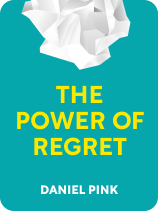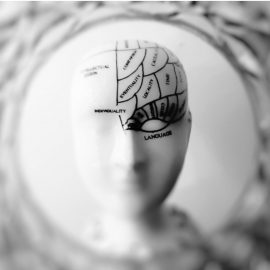

This article is an excerpt from the Shortform book guide to "The Power of Regret" by Daniel Pink. Shortform has the world's best summaries and analyses of books you should be reading.
Like this article? Sign up for a free trial here.
What is Daniel Pink’s The Power of Regret about? What are the main takeaways of the book?
In his book The Power of Regret, Daniel Pink explains why having regrets is a good thing. According to Pink, you can grow from your regrets and use them to improve your life.
Read below for a brief overview of the book The Power of Regret.
The Power of Regret by Daniel Pink
Is there something you wish you could change about your past? If so, you’re not alone. Most people live with regrets—yet believe that an ideal approach to life is to live with “no regrets.” In The Power of Regret book, Daniel H. Pink, New York Times best-selling author of Drive and To Sell Is Human, argues against this approach. Regret is a normal, healthy part of life, according to Pink, and he maintains that regret plays an important role in improving your life. By processing and learning from your regrets, you can lead a happier and more fulfilling life.
We’ll cover The Power of Regret in four parts:
Part 1: What Is Regret? explains the process of experiencing regret to ground our discussion.
Part 2: Common Regrets takes a look at the types of things people regret most about their lives.
Part 3: The Wrong Way to Handle Regret explores what Pink considers to be the worst approaches toward regret.
Part 4: How to Turn Regret to Your Advantage examines Pink’s process for responding to and growing from regrets. We also consider his advice for using regret to make better decisions in the future.
Part 1: What Is Regret?
Before we explain the benefits of regret, it helps to ground our discussion in Pink’s definition of regret. Most people identify regret as a painful feeling that arises while reflecting on past decisions and wishing they had acted differently. However, Pink argues that we should view regret not as a feeling, but as the outcome of a process—not as something we have, but as something we do.
He explains that our brains must engage in a multi-step process to create an experience of regret. In this section, we’ll walk you through the three steps of regret and explain the different factors that enable it.
The Three-Step Process of Regret
Pink explains that the process of regret involves three steps: telling a story about the past, inventing a new story about an alternative past, then comparing the two.
Step #1: Telling a Story About the Past
Pink explains that the first thing someone needs to experience regret is a story about their past. He suggests that we as humans are unique in our ability to tell stories and to “time travel” in our imaginations. We begin the process of regret by creating a narrative about something we did or didn’t do in the past.
Step #2: Imagining an Alternative Story
Pink explains that the second step in the process is creating a new narrative in which you behaved differently in the past. You imagine that your life in the present is different because your past self acted differently.
If your original story was about a poor decision you made or an opportunity you let slip through your fingers, this alternative story is a fantasy where you made the opposite decision or took advantage of the opportunity. In the alternative story, your life played out differently because of this change in the past. At this point in the process, you haven’t yet compared the two stories—you’ve simply created them.
Step #3: Comparison and Evaluation
Pink explains that you complete the process by comparing and evaluating the two presents. You’ll then decide which one you like better: your current life (original story) or the alternative present (alternative story). This stage has two potential outcomes, one leading to regret.
Outcome 1: You like your actual life more than your imagined life. This comparison will produce a sense of relief that you’ve avoided a worse fate than your current life. However, this outcome is extremely rare because most people are more inclined to dwell on what could have gone better in their lives than what could have gone worse. Outcome 1 occurs most often with people who have had near-death experiences or survived natural disasters.
Outcome 2: You like your imagined life more than your actual life. When you see that you’re happier and more fulfilled in the imagined scenario than in your current life, you may feel a sense of pain, loss, or grief. You then attribute this feeling to the decision you made in your first story, leading you to experience regret. For example, if you have a relative who recently passed away and you didn’t spend much time with them, you may think, “If only I’d reached out to this relative sooner, I would have had this relationship in my life.” Pink explains that this second outcome is far more common than the first.
Conditions for Regret
Pink suggests that, beyond creating a story of a preferable imagined life, two additional factors determine whether someone will engage in the process of regret: personal agency and opportunity.
Regret Condition #1: Personal Agency
Pink clarifies that people only feel regret if they believe themselves to be the cause of their negative situation. The comparison between their two possible presents will only produce regret if their negative situation is due to their past actions or decisions.
While almost everyone experiences painful emotions when events don’t work out the way they’d hoped, if they don’t consider themselves the cause of their negative situation, they feel disappointment rather than regret.
That said, Pink offers one important caveat: Sometimes people incorrectly attribute an outcome to their actions when it was actually beyond their control. For example, someone who is laid off from their job may attribute the situation to poor work performance, when actually their company simply decided to eliminate the role entirely. This false attribution may lead them to regret inconsequential mistakes, such as coming to work late once or making a typo on an email. As we will see later in this guide, correctly analyzing the situation is an important part of growing from regret.
Regret Condition #2: Opportunity
Pink explains that people only regret past decisions if they believe they could have chosen otherwise. If there wasn’t a choice they could have made to change the outcome, they can’t really attribute their present situation to this choice. Therefore, people who have more opportunities in a given situation tend to have more regrets.
Part 2: Common Regrets
Now that we understand how people come to experience regret, we’ll explore the kinds of things people regret most. In this section, we’ll cover the difference between regrets of things done and regrets of things not done, and we’ll also explore Pink’s four categories of regret.
Regrets of Things Done vs. Regrets of Things Not Done
Pink first divides regrets into two categories: regrets of things done and regrets of things not done. A regret of things done occurs when people do something and then wish that they hadn’t, such as stealing from a grocery store or cheating on their spouse. A regret of things not done occurs when someone doesn’t do something they wish they had. This could be an opportunity they let pass by, such as starting their own business or asking someone out on a date.
Most people tend to have more regrets of things not done than regrets of things done. Pink also notes that the ratio between the two types also grows more lopsided with age: Young people tend to have an equal number of regrets of things done and regrets of things not done, but as they age, they gain more regrets of things not done. This is because, as time goes by, they have fewer opportunities to finally do the things they wish they had done earlier in life.
The Four Main Categories of Regret
Pink clarifies that most of the regrets people have in life fit into one of four categories. Each of these categories includes either regrets of things done or not done, but they refer to the areas of people’s lives where they wish they’d acted differently. Pink derives these categories from a broad national survey asking people to share their regrets. In this section, we’ll explore his four main categories of regret: stability, ethics, personal risk-taking, and relationships.
Regret Category #1: Stability
Stability regrets occur when people wish they’d done more to invest in creating a stable life for themselves. People experience stability regrets when they realize the destabilizing consequences of their lifestyle late in life and wish they could go back and adopt different habits or attitudes in the past. Common stability regrets include wishing that they had taken better care of their physical health, invested more in their education and skill development, or handled money more responsibly.
Regret Category #2: Ethics
People experience ethical regrets when they feel they’ve acted against their personal code of ethics. These are regrets of things done more often than regrets of things not done, as people reflect on their moral transgressions. However, some people have ethical regrets of things not done as they look back on missed opportunities to serve their communities or stand up for their values.
The most common ethical regrets voiced by participants in Pink’s survey were bullying and infidelity. Many participants also regretted having abortions or missing out on the opportunity to serve their countries through the military or other branches of national service.
Regret Category #3: Bravery
People experience bravery regrets when they fail to take a risk that is important and meaningful to them. These are almost always regrets of things not done, as people look back on their lives and wish they’d taken a risk to do something they really wanted instead of playing it safe. They imagine how their lives would be different if they had followed their dream and see a loss of growth and potential.
People with bravery regrets may wish they had started a business, invested themselves more fully in passions like music or art, chosen a more ambitious career path, or made a big life decision like moving to a new country.
Regret Category #4: Relationships
People experience relationship regrets when they feel they’ve missed an opportunity for a meaningful connection with someone. They compare the life they have without an important person—a friend, family member, or romantic partner—and imagine the life they could have had with this relationship.
Relationship regrets can be either regrets of things done or regrets of things not done. Some people lose relationships because of an action they took, such as starting a fight or pushing someone away out of anger. Others may lose relationships simply because they failed to invest as much as they wanted to and drifted apart over the years.
Relationship regrets are the most common type of regret reported on Pink’s survey. Psychologists have identified quality relationships as the most important predictor of someone’s mental and emotional well-being. Therefore, people feel a great sense of loss at missing out on important relationships, leading them to experience regret.
Part 3: The Wrong Ways to Handle Regret
Now that we understand how regret works and the types of regret you’ll most likely experience, we can turn to Pink’s insights on the worst and best ways to handle regret. Handling regret the wrong way will prevent you from growing from your regrets and using them to improve your life. In this section, we’ll cover his explanation of the three wrong approaches to regret: the philosophy of no regrets, avoiding, and wallowing.
Wrong Way #1: The Philosophy of “No Regrets”
Pink explains that many people hold the view that they should live life without any regrets. This philosophy appears in popular music, self-help books, commercials, and celebrity culture, just to name a few. Pink explains that this philosophy views regret simply as something to avoid because it is painful and because no one can change the past. Therefore, the reasoning goes, a life without regrets is well-lived.
However, Pink counters that this view is foolish and can even prevent people from living their best life. He makes two counterarguments which we will discuss in depth: 1) Regret is a universal part of life, and 2) it is highly beneficial to our lives.
Wrong Way #2: Avoiding
A lot of people will respond to their regret by simply trying to avoid feeling it. Pink argues that this is what most people who hold a “no regrets” philosophy in life are actually doing. This approach may be tempting because it gives someone an excuse to not feel something painful.
However, this approach has two significant drawbacks. First, you can’t avoid the feeling of regret forever. By avoiding your emotions, you’re simply storing the feelings of regret away to cause you pain later in life. Secondly, by avoiding regret, you’ll miss out on the important chance to learn and grow from it.
Wrong Way #3: Wallowing
Many people also respond to their regrets by simply wallowing in them. Pink concedes that this response allows people to feel their regrets very deeply but also argues that it offers no solutions for growing from them and moving past them. He explains that wallowing comes from a philosophy that elevates emotion as the highest personal truth. According to this perspective, feeling emotions at their highest intensity has intrinsic value regardless of whether it helps someone grow.
However, Pink disagrees with this philosophy. He explains that wallowing in your emotions doesn’t provide any benefit because you neither resolve your emotions nor learn from them—they simply continue to cause you pain.
Part 4: How to Turn Regret to Your Advantage
As we’ve seen, Pink argues that regret has the power to benefit our lives, but only if we know how to use it. In this section, we’ll cover Pink’s strategies for processing and growing from regret, and how to improve decision-making by anticipating future regrets.
Processing and Growing from Regret
Pink identifies processing as the best approach for dealing with regret. Broadly speaking, processing includes thinking and reflecting on your past decisions, analyzing the source of your regret, and making new decisions to guide your future actions. Pink considers this a proactive approach that leads directly to action. Once you process and understand your regrets, they can lead you toward a better life.
Pink identifies five steps to help you process and grow from your regret: reveal the regret; forgive yourself; find something positive; find a lesson; commit to action.
Forecasting Regret to Make Better Decisions
Lastly, Pink recommends that you can use your regret to help you make better decisions by forecasting future regrets. When you are facing a difficult decision in life, try to imagine your life years down the road and ask yourself: “Which choice would I regret more?” This can clarify what is most important in your life and help you make better decisions.
However, this advice comes with a catch. People often incorrectly forecast how much they will regret a choice. They tend to overestimate how much they will regret small things in life, like overpaying for an appliance. Many poor decisions are quickly forgotten because life simply goes on.
Therefore, Pink recommends that you use this tactic only for life decisions involving the four main categories of regret. Recall that these are: stability, ethics, personal risk-taking, and relationships. If you are facing a decision that will directly impact these areas of your life, Pink recommends you try to forecast which will cause the greatest regret. Otherwise, there’s no need. You’re unlikely to regret a wrong decision on the smaller things in life.

———End of Preview———
Like what you just read? Read the rest of the world's best book summary and analysis of Daniel Pink's "The Power of Regret" at Shortform.
Here's what you'll find in our full The Power of Regret summary:
- A look at why most people feel regret, and what causes it
- The three worst ways to deal with regrets
- The five-step process for turning regrets into advantages






